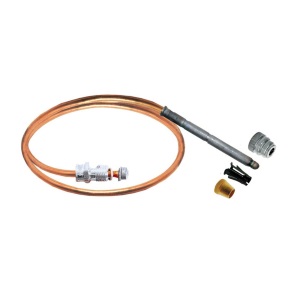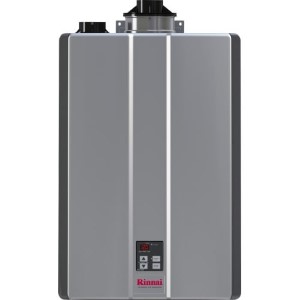- Home
- Water Tank Heater
- Gas Water Heater Thermocouple
Gas Water Heater
Thermocouple Replacement Guide
Gas water heater thermocouple replacement guide. Learn how to test, identify problems and troubleshoot a thermocouple on American, State, GE, Kenmore, Rheem, AO Smith, Bradford White, and other brands.
Highlights
- What is a thermocouple
- How it works
- Problems
- How to test a thermocouple
- How to replace and video instructions
If you require professional assistance, contact your local water heater expert! Get FREE estimates here!
What is a thermocouple?

Every gas water heater that uses the pilot light has a burner assembly consisted of the following elements:
- Main burner
- Main burner orifice
- Gas supply tube for the main burner
- Pilot burner
- Pilot burner orifice
- Pilot burner gas supply tube
- Thermocouple
The gas water heater thermocouple is the safety element designed to "inform" a gas control valve if the pilot flame is ON or OFF, and open or close the gas to the main burner.
The thermocouple is part of the pilot assembly where one end is always in contact with the pilot flame while the other side is connected to the gas control valve. The element is made of a copper tube and is very flexible and fragile.
How does the thermocouple work
Once you manually lit the pilot light, usually by the piezo igniter, it remains ON either water is heated or not. If the water temperature inside the heater’s tank drops below the set point, the thermostat activates, and gas flows to the main burner.
The pilot flame will then ignite the gas. When the water inside the tank reaches the temperature set on the thermostat, the thermostat interrupts the gas flow to the main burner.
The gas water heater thermocouple consists of two different metals, joined together, so when heated by the pilot flame, a small electric current generates. The electric current, then, powers the electromagnet inside the gas valve and keeps it open.
If for any reason the pilot flame is gone, the thermocouple cools down, interrupting the electric current, so the electromagnet closes the gas valve and shuts down the water heater. Sometimes it takes over a minute or two for the thermocouple to cool down and close the valve.
During the initial start-up, a piezo button will light the pilot but has to be depressed for some time, as the thermocouple needs to get hot and produce electricity.
- Find Plumbers In Your Area -
Thermocouple problems
The pilot light does not stay lit when the ignition button is released. The possible cause of an issue is the faulty or loose thermocouple or connections. If the screw nut was loose, tightening it. The defective element cannot be repaired, so replacement is the only option. These elements are not expensive.
If you experience the pilot outage, a thermocouple might not be in contact with the pilot light. Position it according to the manufacturer's specs so it is fully immersed in the pilot flame.
How to test a thermocouple
If the pilot light doesn't stay lit, check the gas water heater thermocouple by keeping the pilot button depressed. Measure the current by using the multimeter device, set on millivolts. One probe of the meter should be connected to the copper sheath of the thermocouple and the other to the gas valve. If the reading shows 10 millivolts (White-Rodgers valve), 13 millivolts (Robertshaw control valve), or higher, the thermocouple is good. Replace the element if the reading is below this value.
How to replace a gas water heater thermocouple with video instructions
- Turn OFF the gas supply to the water heater by using the gas control valve, or the main valve.
- The thermocouple has two ends. Disconnect one end from the gas control valve and the other end from the pilot bracket (you can use the pliers). Be careful not to damage the copper tube... it is very sensitive.
- Install a new element into the pilot bracket, and make sure to have it fully engaged. Connect the other side of the element to the control valve - finger tight and 1/4 turn.
- To resume the operation, follow the lighting instructions found on the label.
Related
- Home
- Water Tank Heater
- Gas Water Heater Thermocouple


